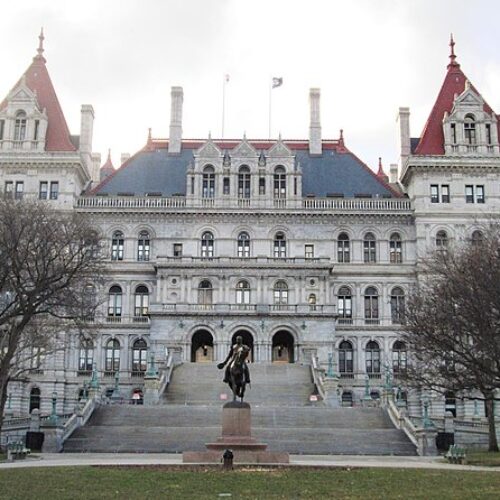Low attorney pay in New York: a cautionary tale for the country

Assigned attorneys in most of New York State have not received a raise since 2004, when the legislature set the compensation rate at $60 to $75 per hour. The consequence? A “crisis” in assigned counsel programs, at least three pending lawsuits, and a threat to the Sixth Amendment.
Assigned attorneys in most of New York State have not received a raise since 2004, when the state legislature set the hourly rates at $60 for misdemeanors and $75 for felonies and capped the total amount an attorney can earn per case at $2,400 for misdemeanors and $4,400 for felonies.
New York’s Office of Indigent Legal Services (ILS) calls this “a crisis in [assigned counsel programs] throughout the state, with people facing gaps in representation, judges struggling to find attorneys willing to take additional cases, and overwhelming caseloads for those attorneys who do accept new cases.”
As a result, the state now faces three lawsuits.
- In July 2022, a state court judge issued a preliminary injunction in a suit brought by the New York County Lawyers Association requiring an immediate and retroactive raise to $158/hour for assigned attorneys in New York City and ordering officials to consider additional increases whenever the federal rate goes up.
- Seeking a similar raise for assigned attorneys in the rest of the state, the New York State Bar Association filed a lawsuit in November 2022.
- And in December 2022, the New York Civil Liberties Union (NYCLU) sued the state for violating its Hurrell-Harring v. New York settlement obligations through “its persistent and unjustified failure to raise assigned counsel rates.”
New York’s failure to adequately compensate attorneys is detrimental to indigent defendants and the criminal justice system more generally. It also threatens the Sixth Amendment.
The Hurrell-Harring settlement
In 2007, NYCLU initiated the Hurrell-Harring class action lawsuit to force the state to address systemic failures in its provision of indigent defense services in five counties. The suit came on the heels of the Kaye Commission Report, which concluded that New York’s indigent defense system was “both severely dysfunctional and structurally incapable of providing” constitutionally effective representation. At the root of New York’s crisis was its 1965 decision to absolve itself of its Sixth Amendment responsibilities and instead require each of its 62 counties to create, fund, and oversee their own indigent defense systems.
The state ultimately settled the Hurrell-Harring lawsuit in 2014, and the legislature expanded key aspects of the settlement agreement to the entire state in 2017. The settlement agreement focuses on three fundamental issues: ensuring that all accused people are represented by counsel at arraignment, instituting manageable caseloads, and implementing quality improvement initiatives.
The Hurrell-Harring settlement has led to real progress throughout the state. But compensation for assigned attorneys remains woefully inadequate. ILS, which is responsible for implementing the settlement, has been urging the state to increase compensation rates since 2015 and last year reported serious settlement violations resulting from the state’s failure to adequately fund assigned counsel programs (ACPs). As detailed in NYCLU’s pending lawsuit, “unreasonably low” compensation has made it impossible for ACPs to attract and retain attorneys with the necessary qualifications and experience. This, in turn, has led to “too few attorneys…to comply with the caseload relief and quality enhancements standards” of the settlement. As NYCLU explains, “[t]he situation is so dire that ACP attorneys have engaged in protests and work stoppages and have limited the number of assigned cases they take (or have stopped taking cases altogether until the rates are increased).”
While the governor’s proposed FY 2024 budget does call for a raise for assigned attorneys, the contemplated rate for upstate attorneys falls far short of the $158/hour now required in New York City, and advocates worry that the proposal will become an unfunded mandate that shifts costs to the local level. And assigned attorneys are not alone in calling for more funding: in New York City, for example, public defender organizations say they are at a breaking point because of stagnant wages and soaring attrition rates.
A cautionary tale for states across the country
Despite the constitutional imperative to adequately compensate indigent defense attorneys, New York’s crisis is emblematic of issues across the country. Some states, such as New Hampshire, Michigan, and Maine, have significantly increased their assigned counsel compensation rates in recent years. But others continue to pay their assigned attorneys even less than New York – for example, Tennessee pays just $50/hour for non-capital cases, and South Carolina pays $40/hour for out-of-court work and $60/hour for in-court work.
Sixty years after Gideon v. Wainwright, it is time for every state in the nation to ensure adequate compensation for indigent defense attorneys. Compensation is critical to attract and retain lawyers with the requisite skills and expertise, to prevent attorneys from taking on more work than they can reasonably handle, and to avert financial conflicts of interest between attorneys and their clients. And as litigation in New York demonstrates, if states do not take responsibility for their Sixth Amendment obligations, courts are prepared to require them to do so.


